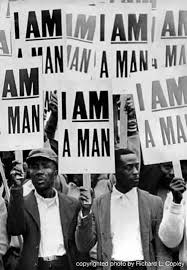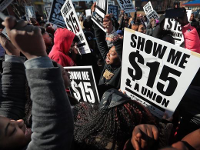|
Wages March Echoes 1968 Memphis Sanitation Workers Strike
February 12, 2018
The Rev. Cleophus Smith campaigned for better wages and working conditions in Memphis on Feb. 12, 2018—50 years to the day that he made the same march as a sanitation worker. Smith was part of a well-known work stoppage in the iconic Tennessee city. At that time, the men who collected the garbage were paid $1.65 an hour; at that time, the federal minimum wage was $1.60 an hour. Workers had no uniforms so had to wear their own clothes, which, in the course of their work, absorbed much of the detritus of the work that they did. They had no union and few benefits. Their work was dangerous, involving hefting heavy garbage drums by hand. On February 1, two workers, Echol Cole and Robert Walker, were crushed by their truck's compression mechanism, which had malfunctioned. On that day in February, 11 days after Cole and Walker's deaths, the survivors had had enough. They walked off the job–1,300 of them–and stayed off the job until April. Not all sanitation workers went on strike; the ones who did made their presence felt: During marches to protest their plight, they carried signs that read, "I AM a Man." One of the Civil Rights movement's most well-known faces, the Rev. Dr. Martin Luther King, Jr., was in Memphis several times during the sanitation workers strike. During one march in which he participated, violence ensured not long after the march began and Memphis Mayor Henry Loeb called in the National Guard to keep the peace. After the passage of the Civil Rights Act of 1964 and the Voting Rights Act of 1965, King turned his attention to the urban poor. The 1967 Poor People's Campaign filled a spot in Washington, D.C., with some of the nation's poorest people. King and others hoped to draw the nation's attention to the huge disparity in income levels between rich and poor and between white and black. (The two often correlated.) King was in Memphis on April 4, the day that he died. The strike and the movement went on without him, for a time. The workers eventually got their union and Social Security benefits. A full 50 years later, however, workers in low-paying jobs in Memphis are at it again, marching and carrying signs. Some say, "I AM a Woman." A few dozen of the original sanitation workers are still around and are being celebrated by today's marchers. The Rev. Cleophus Smith (left, with another original striker, Elmore Nickleberry) is set to retire in 2019. This year's activities are part of the Fight for $15 campaign, a nationwide effort to raise wages. Fast food workers across the South went on strike on February 12, the 50th anniversary of the beginning of the Memphis sanitation strike. The federal minimum wage is $7.25; the last time that Congress raised it was in 2009. Washington, D.C., and 29 states have minimum wage higher than $7.25 an hour. Washington, at $11.50, is the highest. |
Social Studies for Kids |
Social Studies for Kids
copyright 2002–2019
David White







